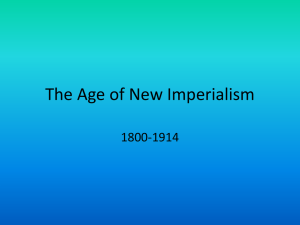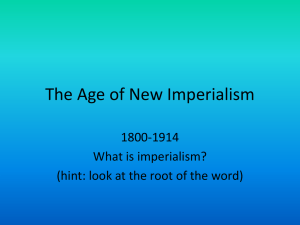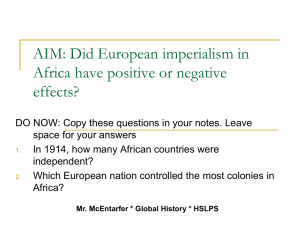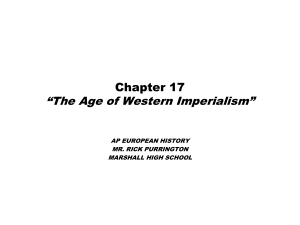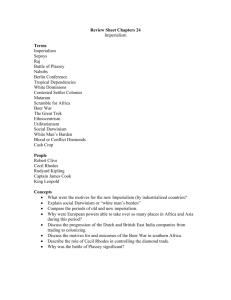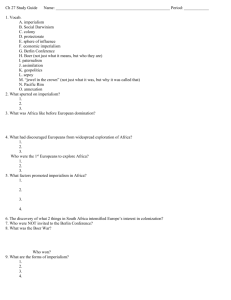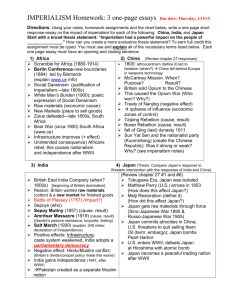The Age of New Imperialism
advertisement
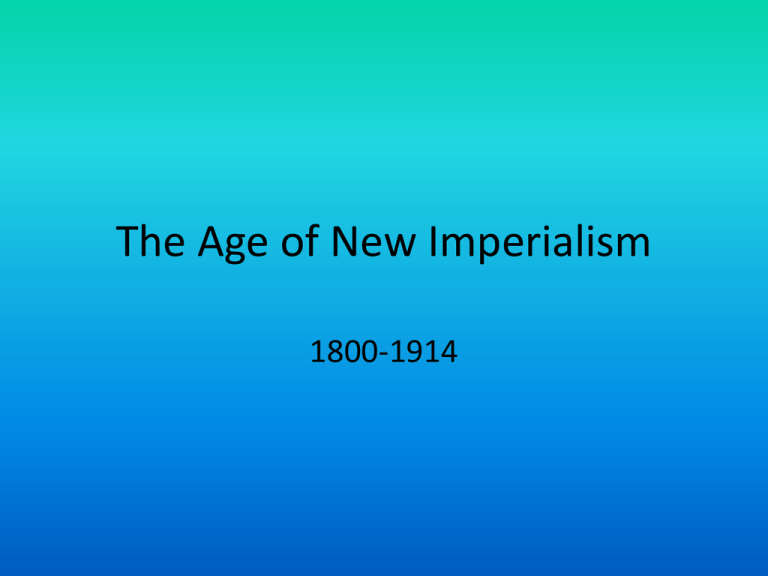
The Age of New Imperialism 1800-1914 The Devilfish in Egyptian Waters Imperialism • A policy where stronger nations dominate the political, economic, or cultural life of weaker nations. • A new wave began in the 1800s. Original wave started back in the 1400s. • Born out of the new industrial society of the 1800s. Countries were richer and more powerful. Map of Colonial Empires in 1914 Causes 1. 2. 3. 4. Economic Interests ($$$) Political/Military Interests (Nationalism) Humanitarian/Religious Goals Social Darwinism Economic Interests • The Industrial Revolution – Industrialized countries needed natural resources • Ex: rubber, petroleum, manganese for steel, palm oil for machinery – Also wanted new markets to sell factory goods to – Colonies were valuable outlets for overpopulation in home countries Raw Empire Materials Colony Emigrants Finished Goods Political/Military Interests • IN’s needed naval bases around the world – Seized islands and harbors • Competition/maintaining balance of power – Empire = prestige and greatness – Ex: when France got colonies in West Africa, GB and Germany did too to prevent France from becoming too powerful Humanitarian/Religious Goals • Many Westerners believed they had a moral duty to spread their “superior” way of life – Western technology, law, medicine, education • Also felt they needed to “Christianize” the “barbarians” in other parts of the world. • It was very ethnocentric…but…many wellmeaning missionaries and doctors accompanied the imperialists • Two arguments: western advances did benefit natives; natives were denied their culture Social Darwinism • Imperialism was based on feelings of racial superiority; this theory justified colonies. – Racism: the belief that one race is superior to others • Social Darwinists applied Charles Darwin’s ideas about natural selection and survival of the fittest to human societies. • Imperialism was nature’s way of improving the human race. What made imperialism possible? • Weakness of conquered areas – Africa weak because of slave trade – Lack of weapons/technology • Western strengths and advantages – Strong economies and governments – Powerful armies and navies – Superior technology • Steam-powered ships, Maxim machine gun (1889), repeating rifles, the telegraph, quinine Meeting in Berlin • Berlin Conference, 1884 – A gathering of European powers held in Berlin. – This was a means of avoiding war between the powers. – It established ground rules for staking claims in Africa. Forms of Imperialism • Colony – direct control, most intrusive • Protectorate – local rulers left in place, but still under control of European advisors • Sphere of influence – exclusive investment or trading privileges • Economic Imperialism – most politically independent, but ldc’s indirectly controlled by large businesses Impacts • Positive: medical advances, hospitals, schools – Life expectancy and literacy rates increased • Negative: Africans lost control of land and their independence – Forced to mine or plant cotton and other cash crops instead of their own food crops – Famine – Loss of traditional culture
